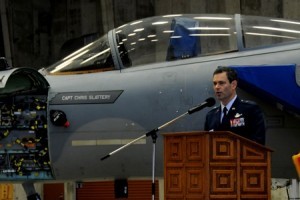 U.S. Air Force officials at Kadena Air Base celebrated the arrival of four F-15Cs upgraded with the APG-63(V)3 Active Electronically Scanned Array (AESA) radar on Oct. 21. The newly arrived F-15Cs will join the APG-63(V)1 and (V)2 aircraft already in the 44th and 67th Fighter Squadrons to provide unmatched combat power for the defense of Japan. The upgrades were installed and tested at Langley Air Force Base, Va.
U.S. Air Force officials at Kadena Air Base celebrated the arrival of four F-15Cs upgraded with the APG-63(V)3 Active Electronically Scanned Array (AESA) radar on Oct. 21. The newly arrived F-15Cs will join the APG-63(V)1 and (V)2 aircraft already in the 44th and 67th Fighter Squadrons to provide unmatched combat power for the defense of Japan. The upgrades were installed and tested at Langley Air Force Base, Va.
Boeing is under contract to fully upgrade 27 Air Force and 18 Air National Guard F-15C/D aircraft with the APG-63(V)3 AESA over the next 10 months. A total of 54 AESA-equipped F-15C/Ds are scheduled to be on station at Kadena by September 2013.
“The fielded APG-63(V)3 air-to-air capabilities put the F-15C/D in a class by itself and ensure that the Air Force and Air National Guard F-15C/D fleets remain capable, maintainable and affordable,” said Todd Burns, F-15C AESA program manager for Boeing. “Delivery of these four aircraft on schedule demonstrates Boeing’s commitment to ensuring the F-15 remains a world-class multirole fighter.”
Boeing’s Global Services & Support division provides U.S. Air Force F-15 sustainable services including ground support equipment, spares and retrofit programs, contractor field teams and a full range of training systems and services.
The Raytheon APG-63(V)3 is a highly reliable and affordable high-performance AESA for the F-15 air-to-air variant. The AESA radar antenna is 50 times more reliable than the mechanically scanned antenna it replaces.
“This system improves our capabilities and lethality as a combat air force. We will fly our missions equipped with the world’s most powerful air- to-air radar,” said Brig. Gen. Ken Wilsbach, commander of the 18th Wing at Kadena. “This capability strengthens our ability to carry out our mission to provide unmatched combat power, provide a forward power projection platform, and provide for the common defense of Japan.”
The APG-63(V)3 radar is the latest in a series of planned upgrades that will ensure the F-15C’s combat-proven air supremacy well into the 21st century. These include a fighter-to-fighter data link, GPS navigation and the Joint Helmet Mounted Cueing System, which enable the warfighter to conduct network centric operations while employing the latest air-to-air weapons.



